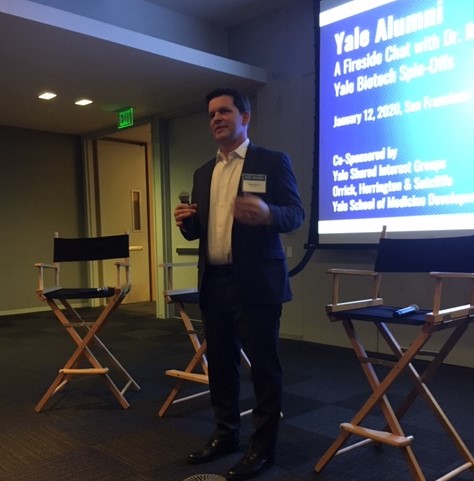Immediately prior to the 38th annual J.P. Morgan Healthcare Conference, the YAA Shared Interest Groups department hosted alumni working in biotech and the life sciences at an evening reception in San Francisco at Orrick, Herrington & Sutcliffe.
The event, held January 12, was sponsored by the YAA in partnership with Orrick and the Yale School of Medicine Development and Alumni Affairs.
The evening featured a “fireside chat” about immuno-oncology drug treatments and new research, led by Yale Professor Dr. Roy Herbst ’84 and moderated by Chau Khuong ’99, a partner at Orbimed. The chat also featured Kevin Heller ’93, chief medical officer for NextCure, and Tony Gibney ’93, chief business officer for Achillion Pharmaceuticals (now part of Alexion), who spoke with Herbst and Khuong about the research, trials, and business aspects of biotech advances in cancer medicine.
The alumni connection continued throughout the event: Melissa Frayer ’08, a senior associate at Orrick, Herrington & Sutcliffe, welcomed the crowd of 130 alumni; Darren Cai ’98 MBA spoke on Yale alumni working in biotech and also the Yale Healthcare Club of China, a new YAA interest group; and School of Engineering & Applied Science Dean Jeffrey Brock ’92 made the connection back to campus, providing highlights about science and innovation at Yale.
In addition, Nicholas Roman Lewis ’93, senior director for YAA Shared Interest Groups, invited the room to the next worldwide interest group event, the Yale International Alliance Conference on Global Citizenship, which will take place in Rome, Italy, March 13-14.

“This event was timed with J.P. Morgan to gather alumni working in biotech and the life sciences,” Lewis said. “There is interest for more connectivity in this community and we look forward to having more engagements with these alumni.”
Immuno-oncology has represented a significant area of innovation in cancer therapy, showing a 25% decrease in cancer deaths over the past 20 years. Setbacks as new treatment is developed underline the importance of working toward new targets through new angles, with close collaboration required between biotech companies and clinicians. The buzz at this year’s J.P. Morgan Healthcare Conference centered on the emerging areas of treatment, especially in oncology and neurology. A diversification of substantive, risk-taking areas thanks to increased research funding is fueling entrepreneurial pursuits, including new technology generated by Yale biotech spin-outs.
Herbst suggested that the next step in cancer therapy will be the use of artificial intelligence, and he noted that success with this requires close collaboration among partners and patients.
“The last 20 years, we’ve personalized cancer – we’re no longer personalizing therapy,” said Herbst. “It will take collaboration and time to personalize treatment again.”
As the evening’s program turned over to a bustling room of conversation and connection, circles of alumni resounded interest in launching a new shared interest group for alumni working in biotech and the life sciences. Alumni interested in the new biotech interest group should contact Stephanie Double.




